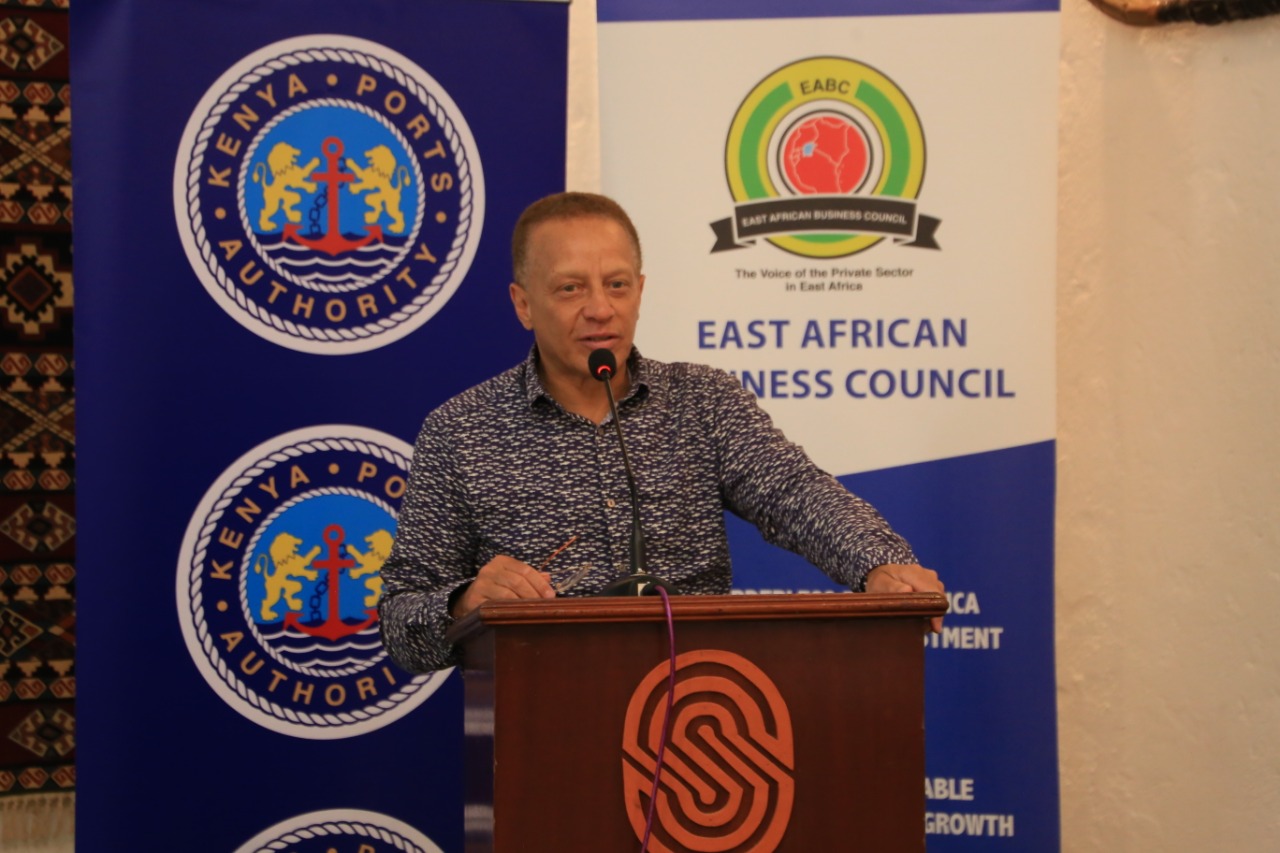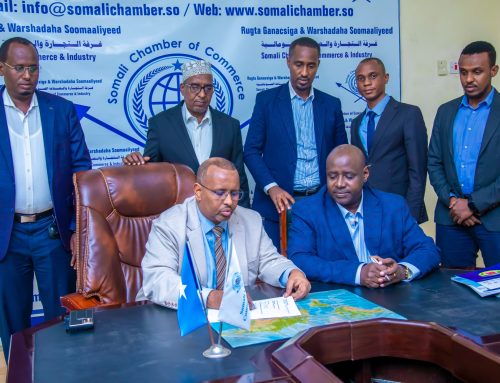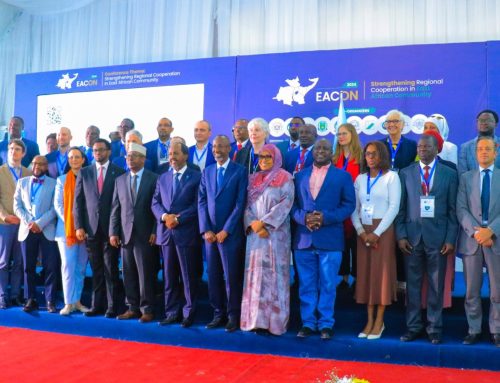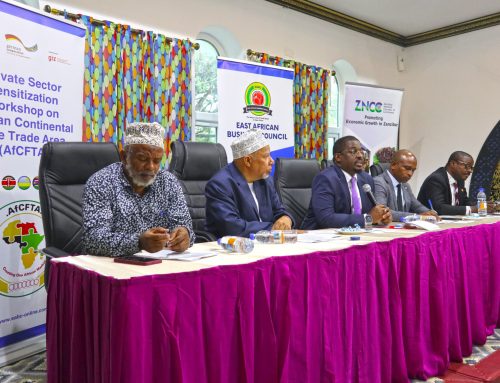Thursday, 16th September 2021 Mombasa, Kenya: – The East African Business Council (EABC) Chairman Mr. Nicholas Nesbitt has urged the EAC Partner States to fast track digitalization of transport & logistics value chains to enhance efficiency and export competitiveness of the EAC bloc in light of the African Continental Free Trade Area (AfCFTA) and the disruption of the COVID-19 pandemic.
Speaking during the East African Maritime Leaders Round Table organized by EABC in partnership with the Kenya Ports Authority (KPA) in Mombasa, Kenya, Chairman Nesbitt, elaborated that “ Articles 93-94 of the treaty for the establishment of the East African Community calls for co-operation among port authorities and harmonization of tariffs and regulations in the region.”
He said that the adoption of digital technologies to automate the EAC shipping, transport & logistic industry will reduce the cost of doing business, improve export competitiveness and ease the movement of cargo from the ports to trucks to clients.
Congestion, delays, complex freight clearance procedures, inadequate storage & berthing facilities piracy and terrorism are among the challenges at the ports. Chairman Nesbitt also urged the EAC Secretariat to develop an Integrated Maritime Safety and Security Strategy and the review of the EAC Customs Management Act.
Mr. Newton Wang’oo, Chair Kenya Transporters Association speaking on behalf of KEPSA CEO Mrs. Carole Karuga said “Over the period 2013 to 2019, cargo traffic at the port of Mombasa has increased from about 22 million tonnes to 34.4 million tonnes.”
Mr. Wang’oo urged for harmonization, digitalization, reduction and simplification of export procedures and documents. He recommended for re-configuration of the Integrated Customs Management System (iCMS) on the declaration module to accept multiple containers citing that a consignment of 20 containers of export tea requires 21 customs declarations to process that is, one E100 and 20 E112s for each container. Previously one E100 declaration would suffice.
Mr. Wang’oo called for public-private partnerships to improve regional infrastructure connectivity such as the construction of roadside stations for truck drivers along the transport Corridors.
Speaking on behalf of Amb. John Mwangemi, Ag. Managing Director, Kenya Ports Authority, Mr. Peter M. Masinde, Head of Inland Container Depots KPA said ”this Maritime Round Table is a precursor to the East Africa Maritime Awards (EAMA) Gala Dinner slated tomorrow”
Mr. Masinde lauded that the Port of Mombasa for embracing ICT Systems namely the Kilindini Waterfront Terminal Operating System (KWATOS), the Systems Application Product (SAP) allowing quick online clearance processes. He stated that the COVID-19 impacted the USD. 117 billion cruise sector by reducing shipping cargo volumes.
In 2020, total cargo throughput at the Port of Mombasa was 34.12 million MT a 0.9% decline in comparison to 2019. “Positively during the period January – August 2021 cargo via Port of Mombasa increased by 8.1% recording 23,889,758 tons against 22,095,917 tons handled in the corresponding period in 2020,” said Mr. Masinde.
Mr. Silvester M. Kututa, Chairman & Founder Express Shipping & Logistics EA Ltd stated that the cost of container shipping is on a sharp rise due to rising fuel prices and COVID-19. Mr. Kututa recommended for improvement of value addition & manufacturing, reduction of balast voyages and boosting of exports from the EAC region.
The East African Maritime Leaders Round Table was attended by over 50 business leaders including Mr. John Bosco Kalisa, EABC CEO, Mr. Gilbert Langat, CEO, Shippers Council of Eastern Africa (SCEA), Mr. Omae Nyarandi, Executive Secretary, Northern Corridor Transit & Transport Coordination Authority (NCTTCA), Mr. Auni Bhaiji, Regional Director, Bollore Africa Logistics, Mr. Lino Criel, Secretary-General, Uganda Clearing & Forwarding Agents Association, Dr. Merian Sebunya, Chairperson, National Logistics Platform (NLP), Uganda among others.
The panel and round table discussions recommended the following: improvement of hard and soft infrastructure to address cost of doing business, Public-Private Dialogue to improve production and productivity & addressing supply-side constrains , improving access to capital, simplification of documentation requirements to export, improving Infrastructure connectivity – road, rail and waterways in order to take advantage of the African Continental Free Trade Area (AfCFTA), harmonization of policies at the ports & adoption of a single customs clearing system by the EAC Partner States, review of high insurance premiums on ships transiting through the EAC maritime domain, Republic of South Sudan to join the Single Customs Territory, reduction of taxes on logistical equipments, fast track the admission of DRC into the EAC, embracement of digital technologies such as blockchain & robotics, activation of the EAC trade remedies committee and finalization for the EAC Non-Tariff Barriers Act to reduce the current trade disputes and tensions in the bloc.
Issued by:
Mr. John Bosco Kalisa
Executive Director/ CEO
East African Business Council (EABC)
9th Floor Mafao House | Old Moshi Road | Arusha | Tanzania
P. O. Box 2617 | Tel: +255 27 2520162
Email: director@eabc-online.com I Website: eabc.info
EABC – The Voice of the Private Sector in East Africa
About East African Business Council: The East African Business Council (EABC) is the regional apex body of private sector associations and Corporates from the 6 East African countries. It was established in 1997 to foster the interests of the private sector in the integration process of the East African Community. EABC vision is a borderless East Africa for business and investment. The primary mission is to promote sustainable private sector- driven growth in the EAC.





